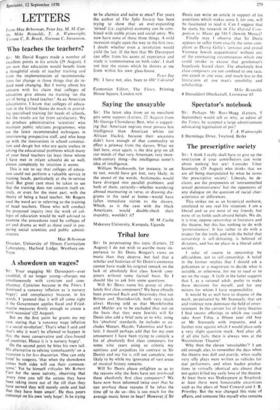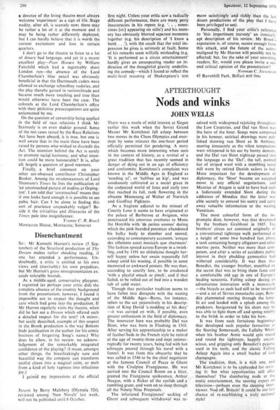The prescriptive society
Sir: I think I really shall have to give up the SPECTATOR if your contributors can write about nothing but sex! Consider Tibor Szamuely (29 August) who thinks that we are all being manipulated by what he terms 'the prescriptive society'. Liberals, he de- clares, are the proponents of 'untrammelled sexual permissiveness' but the opponents of any dialogue on the question of racial char- acteristics or differences.
This strikes me as an hysterical outburst, unrelated to any real life situation. I am a liberal and so are most of my friends, but none of us holds such absurd beliefs. We do, it is true, oppose censorship in literature and the theatre, but this has nothing to do with 'permissiveness'. It has rather to do with a respect for the truth, and with the belief that censorship is self-defeating, is beloved of dictators, and has no place in a liberal adult society.
I refer of course to censorship by officialdom, not to self-censorship. A belief in the former implies that I should ask a policeman or a magistrate to decide what is suitable, or otherwise, for me to read or to see on the stage. A faith in the latter suggests that I, as a rational adult. prefer to make these decisions for myself, and for any minors for whom I have responsibility.
It would be as well here to dispose of the myth, perpetuated by Mr Szamuely, that sex and violence now dominate the field of enter- tainment In the current list of forty theatres I find twenty offerings to which one could take Aunt Edna, a fifteen year old boy or Mr Szamuely with impunity, and a further nine against which I would place only a very slight question mark. And after all, if all else fails, there is always MRA at the Westminster Theatre!
Why then the eleven 'unsuitables'? I am old enough. alas, to remember the days when the theatre was dull and puerile, when really very silly plays were written as vehicles for star performers, and when leaden produc- tions in virtually identical sets almost (but not quite) killed my early love of the theatre. At least there was Shakespeare at Stratford; at least there were honourable excentions such as the plays of Noel Coward and J. B. Priestley. But the war changed this state of affairs, and someone like myself who remains
a devotee of the living theatre must always welcome 'experiment' as a sign of life. Stage nudity, after all, is scarcely new; there may be rather a lot of it at the moment and it may be being rather differently deployed, but I can hardly believe that it is worth the current excitement and fuss in certain quarters.
I don't go to the theatre to listen to a lot of dreary bad language, and yet in a recent excellent play—Poor Horace by William Fairchild which had a regrettably short London run—the absence of the Lord Chamberlain's blue pencil was obviously beneficial in that the Dartmouth cadets were allowed to exchange schoolboy ruderies, and the play thereby gained in verisimilitude and became much more touching and true than would otherwise have been the case. The colonels at the Lord Chamberlain's office with their philistine preoccupations are quite unlamented by me.
On the question of censorship being applied in the field of race relations I think Mr Szamuely is on even shakier ground. Some of the test cases raised by the Race Relations Act have been absurd, it is true, but one is well aware that in the main these have been raised by persons who wished to discredit the Act. Tice intention behind the Act is surely to promote racigl_harmony, and What inten- tion could be more honourable? It is, after all, largely a question of good manners.
Finally, a brief comment on your other sex-obsessed contributor Christopher Booker. Among the misdemeanours of Lord Thomson's Times he lists the publication of 'an unretouched picture of nudists at Orping- ton'. I am told that 'unretouched' means that if one looks hard enough it is possible to see pubic hair. Can I be alone in finding this sort of prurience unspeakably vulgar? Be- side it the trivialities and illiteracies of the Times pale into insignificance.















































 Previous page
Previous page